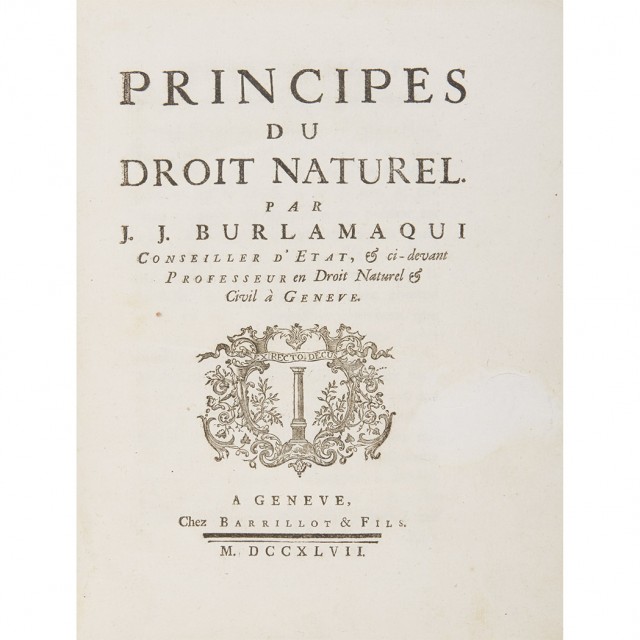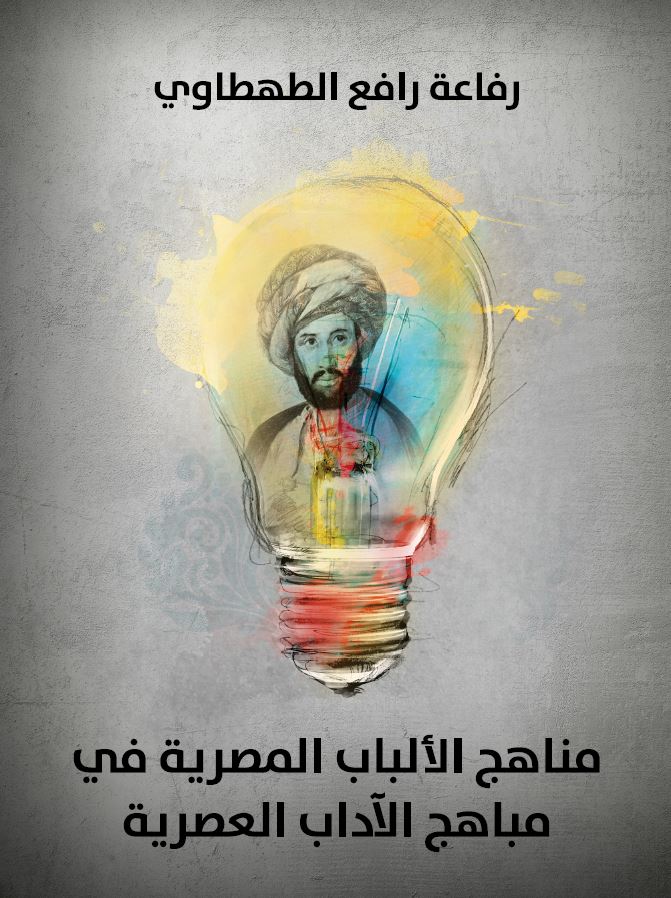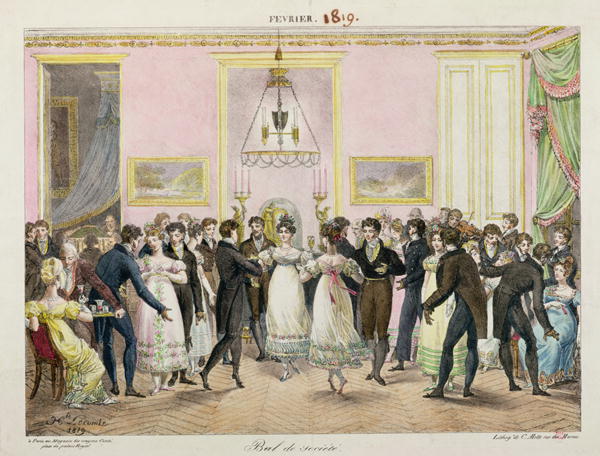
It should be noted carefully that al-Ṭahṭāwī’s thoughts on progress in its various aspects resulted not merely from intellectual considerations and a deep reading into the Arab heritage and French literature, but are primarily the fruit of living alongside Europeans in Paris from 1826-1831, and understanding of its various aspects and the foundations on which these were based. We may discuss here the nature of al-Ṭahṭāwī’s thinking in a number of fields.
PRIOR TO HIS MISSION he lived in Egypt through a period replete with political transformations. He was born in 1801, the year in which the French campaign departed Egypt and Muḥammad ʽAlī appeared on the scene. In the events that followed Muḥammad ʽAlī acceded to power.
Political thinking
During his mission to France al-Ṭahṭāwī indicated his interest in writings on politics:
On natural rights I read the work Principes du droit naturel (‘Principles of Natural Law’) by Burlamaqui[1] which I translated and studied thoroughly. The technique of this is based on the idea of mental improvement or disfigurement, which the Europeans make the basis for their political rulings which they term ‘legislation’. I read also with Monsieur Choualier two volumes of the work entitled l’Esprit des lois by the celebrated French author Montesquieu, who made a balance between legal and political schools of thought based on this mental improvement and disfigurement principle. They call him the European Ibn Khaldūn, just as Ibn Khaldūn is called by them the Montesquieu of the East, that is, the Montesquieu of Islam.
I also read in this field a book entitled Le Contrat Social by an author called Rousseau, of great value. I also read daily and monthly Kazitāt (gazettes – books and magazines) that featured every day news of internal and external affairs termed Politiques that I perused avidly.
The above shows al-Ṭahṭāwī’s knowledge of the most important books on the philosophy of politics that underpinned political thought at that time. Al-Ṭahṭāwī realized how much modern political thought differed from the theory of governance as it was applied in Egypt and the Arab world at that time, and he used the term ‘mental improvement and disfigurement’ to describe the empowerment of the mind and its actions, and the application of theories that thought attain to, including in the field of politics, without taking as their starting point religious works. Al-Ṭahṭāwī was familiar with the term ‘politics; in the European sense, and politics in al-Ṭahṭāwī’s understanding embraced both internal and external affairs (in the sense of management and policy, and the rotation of power).
Al-Ṭahṭāwī thus categorised politics according to the usual division in Europe: external politics, which dealt affairs between states and their populations, and internal politics, which dealt with affairs within one country, as regards its organisation and management.
He made reference to an important issue in political affairs: how the French has imposed an important amendment to the title of the head of the French state. Earlier kings in France used to accord themselves the title ‘By the grace of God Almighty King of France’ with their kingship thus granted them by way of divine right or divine mandate. But the events of the year 1830 forced the king to amend this title to ‘King of the French’ and to consider this title as emanating from the people, since the people were the source of the authority and the ruler ruled by delegation from the people. This issue is very similar to what happened to Muslim kings in the past, something which teaches us that the religious ruler has the same characteristics as those found in all religions, for all their different personalities.
In his successive books, al-Ṭahṭāwī dealt with the varying ways that freedom is expressed, the most important being freedom of religion, freedom of opinion, political freedom, and freedom of ownership. As for religious freedom, this was the subject of Article 5 of the French Constitutional Charter, and the text of this article in al-Ṭahṭāwī’s translation reads as follows:
Every person present in the country of the French follows his religion as he likes. He is to be aided in this and anyone impeding his worship is to be impeded.[2]
Al-Ṭahṭāwī also dealt with other freedoms that he mentioned in the field of civil rights or community rights, including the freedom of movement. On this al-Ṭahṭāwī noted that a citizen was free and granted the ability to move from place to place, region to region without anyone preventing him or obliging him. Moreover, it a citizen may not be exiled without a legal ruling and every person has the absolute right to choose his place of residence without arbitrariness from the ruling authority.
Economic thinking
The economic issue occupied an important place of al-Ṭahṭāwī’s thought in his book Manāhij al-Albāb al-Maṣriyya fī Mabāhij al-Ādāb al-ʽAṣriyya (‘The methodology of Egyptians’ minds with regard to the marvels of modern literature’) in which he dealt with several aspects of economic theory and economic history. He was particularly preoccupied with the questions of labour and capital, the relationship between productivity and services, and the role played by the state in economic life.
Al-Ṭahṭāwī’s encounter with European society during his stay in Paris was his first realization of the necessity for societal change in the Islamic world
Al-Ṭahṭāwī is considered to be the first modern Arab author who accords labour its due right in economic life and sees it as the primary component for production and prosperity. He ascribes disparities among states to work and productivity, arguing:
A nation advanced in activity and industrious manufacture, perfectly functioning with perfect tools and with ingenious and constantly working machines, rises to the highest levels of happiness and prosperity through the performance of these actions, unlike other nations who enjoy vast, warm, fertile lands, whose people have yet to exit the circle of poverty and deprivation. A comparison between most of the regions of Europe and Africa will show you the truth of this.
Social thinking
Al-Ṭahṭāwī’s encounter with European society during his stay in Paris, and his awareness of the differences between them and the societies of the Islamic East in his time, was his first realization of the necessity for societal change in the Islamic world. He dealt with many social issues, including the issue of women.
Al-Ṭahṭāwī noted that confusion concerning a woman’s chastity was not a matter of how much they revealed of themselves, but was rather an issue of good or bad upbringing, the exclusivity of their affection towards a single person and harmony between the spouses. Chastity, in al-Ṭahṭāwī’s opinion, was the result of education. As for women’s entering out into social life, this was another issue:
chastity is something more prevalent in the hearts of women of the middle class than the upper class or the rabble, for the women of these latter two classes often stand under accusation.
Al-Ṭahṭāwī also confirmed that dancing, music and singing enjoyment in European societies were a function of artistic entertainment, and were not held to be a matter of vulgar pleasure-seeking or unacceptable behaviour.
Al-Ṭahṭāwī also dealt with the issue of the dhimmīs[3] (‘protected minorities’) in Islamic society. His opinion in this field is based on two foundations: the freedom of conscience and the necessity of dealing all citizens of the country in a framework of equality and the rule of law.

Suggested Reading
Educational thinking
Education, in his opinion, was an indispensable necessity for mankind. Man distinguishes himself from all other creatures due to his reason, and it is this reason that provides a means for protection, in contradistinction to animals for whom it is physical strength that enables their preservation. Thus, education is the path to progress, and the education of individuals in a sound social manner leads to the advancement of the nation:
The proper education of the collective body, that is, the nation as a whole, depends on the proper education of individuals, both male and female, and its dissemination. The nation that raised its children well and trains them to benefit their homeland is the nation that is considered happy and a community worthy of praise.
Al-Ṭahṭāwī noted that Greek civilization rose in its early days due to Greece’s interest at that time in education in general:
The principal reason for the abundance of great men and heroes in Greece in their days of pagan ignorance[4] was due to the quality in the education of their children.
Rifāʽa al-Ṭahṭāwī was a pioneer of modern Arab thought in the political, economic, social, educational and scientific fields. Here we have attempted to trace the most important ideas motivating this great nahḍa thinker. Rifāʽa al-Ṭahṭāwī was the figure who opened wide the door to they type of thinking that has come to triumph over many years.
[1] Jean-Jacques Burlamaqui (1694–1748) honorary professor of ethics and the law of nature at the university of Geneva. His work Principes du droit naturel was published in 1747, and its fundamental principle may be described as a form of rational utilitarianism. He was the first philosopher to articulate the quest for happiness as a natural right, a principle that Thomas Jefferson later restated in the Declaration of Independence. (Ed.)
[2] The text in the French Constitutional Charter of 1814 runs: ‘Chacun professe sa religion avec une égale liberté, et obtient pour son culte la même protection’. (‘Every one may profess his religion with equal freedom, and shall obtain for his worship the same protection’). (Ed.)
[3] See Glossary.
[4] Al-Ṭahṭāwī is using here the doctrinal term jāhiliyya. See Glossary. (Ed.)
Read Part 1 of this essay here


Download the Arabic text here (17.5 MB)

